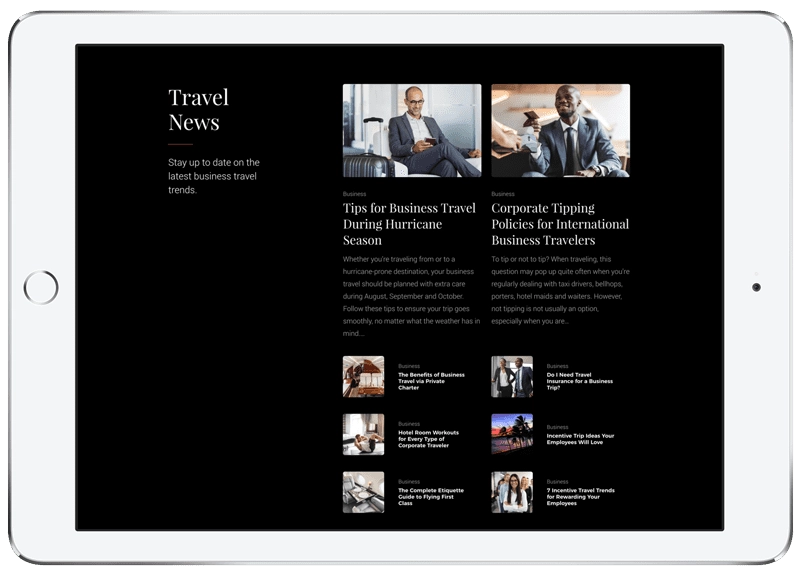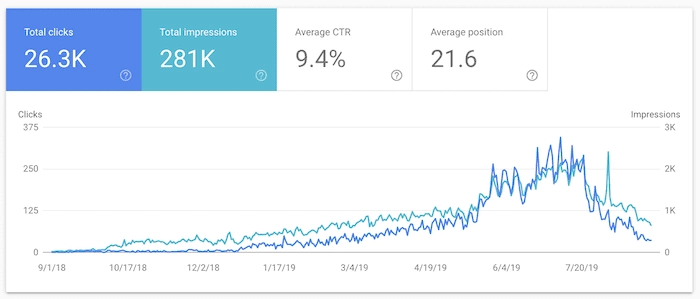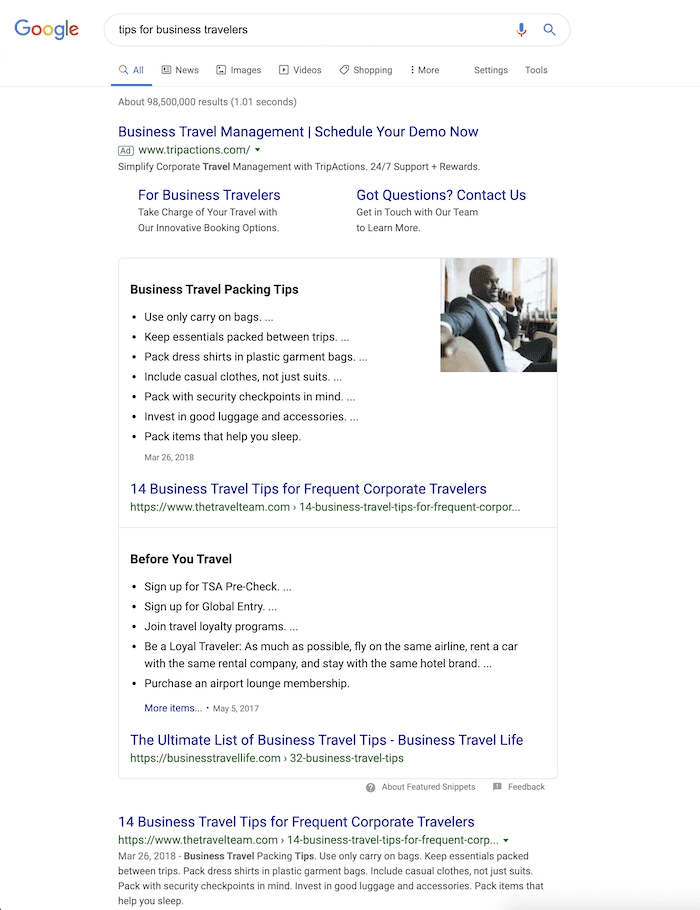In the last year, The Travel Team’s website traffic more than doubled, despite shifting focus away from paid ads and email marketing. During the same time frame, organic traffic grew 7.5 times. This exponential organic growth is the result of a coordinated, optimized content marketing effort.
The travel industry presents digital marketing challenges, including stiff competition from big brands within the search engine results, seasonality, and ever-changing travel rules and regulations. Working with The Travel Team’s industry experts, we created a content-based solution that positions the agency as an online resource for corporate and leisure travel.
The Travel Team’s resulting content marketing success includes strategies and tactics that can be applied to any industry.
Support Business Goals
Just like any piece of a smart marketing strategy, search engine optimized content must support a business’s goals. For The Travel Team, this means aligning each blog post with one area of the agency’s expertise: corporate travel, groups and meetings, and leisure travel. Our content strategy is designed to capture relevant traffic that can be easily identified by the type of posts they’re reading.
We integrate blog posts and other internal links throughout The Travel Team’s website to help visitors navigate through relevant travel services and content on similar topics. Contact forms on every page, including blog posts, make it easy to learn more about a topic from the agents at The Travel Team, no matter what page you land on first.


The Travel Team’s content calendar mirrors other business goals as well. Seasonal trends affect the travel industry, especially in Buffalo. Updates to travel requirements also change how The Travel Team’s agents serve their clients. These industry trends are great additions to an optimized content strategy because they answer questions that searchers are asking with in-depth information from an authoritative source.
Drive Relevant Traffic
We added search optimized content to The Travel Team’s digital marketing plan for long-term growth that complements short-term campaigns. Consistent, relevant, authoritative content drives traffic to The Travel Team’s website organically. Over time, optimized blog posts rise in the search engine results for an array of relevant phrases, increasing the number of visitors to the agency’s website.
Rank Well
In the last year, a blog post titled 15 Cool Weather Summer Vacations in the US received over 26,000 clicks from Google’s search results from almost 500 unique search queries. It outranks similar articles from U.S. News Travel, TripSavvy, and Travel and Leisure. Thorough keyword research and an intent to create the best resource available led to this success.
Of course, keywords with seasonal intent like this one won’t always drive traffic. Searchers use the keywords this blog post ranks for more often in April, May, June and July. Our position in the search results isn’t the reason for a decrease in traffic to this landing page; searcher behavior is. The seasonality of many travel-related keywords makes it important to plan ahead when developing The Travel Team’s content strategy.


Encourage Clicks
Ranking well is only part of the challenge of SEO content. Appealing to search engines is one thing; encouraging potential customers to visit your website from the search results is another. A higher click through rate from the search engine results page means more website visitors for The Travel Team. It’s also widely considered an indirect ranking signal within Google’s algorithm.
We write each blog post’s title and meta description to closely mirror the words and phrases travelers search with. They also clearly describe what a searcher can expect from the content to encourage relevant clicks. The posts themselves answer searchers’ questions thoroughly. We also format blog posts to capture featured snippets where possible for even higher click through rates.
For example, the blog post 14 Business Travel Tips for Frequent Corporate Travelers currently holds a featured snippet (as well as position 1) for the search term “Tips for Business Travelers.” It also enjoys a click through rate of over 40% from Google’s search results.

Relevant organic traffic helps The Travel Team capture leads immediately through their contact form and a prominent phone number. The brand also builds a reputation as a trusted travel resource among site visitors and search engines. The agency’s website is constantly growing a remarketing list for future paid advertising efforts as well.
Be Sharable
The primary purpose of The Travel Team’s blog posts is to capture travelers’ attention in the search engine results. We write content with other distribution channels in mind as well, such as Facebook, LinkedIn and email marketing.
14 Business Travel Tips for Frequent Corporate Travelers drives traffic from a variety of sources. This versatility is essential when success relies on shifting algorithms. The same blog post that enjoys a 40% click through rate in Google’s search results and accounts for almost 10% of all organic search-driven visits to The Travel Team’s website is also responsible for 8.5% of website visits from social media in the last year.
Many of the same types of content that attract website visitors from search engines also do well on social media. Listicles (like the one above), high-quality images of beautiful destinations, and trending or seasonal topics with the potential for long-term success help The Travel Team attract visitors from a variety of sources.